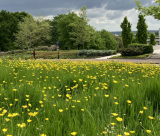Fringe benefits…
September 2nd, 2011
How long does a fledgling writer need to draft an outline for a play worthy of the world’s biggest arts festival?
University copywriter Jane Upton scribbled the opening lines of her monologue in just 30 minutes at the end of a two-day play-writing workshop.
Fast-forward a year and Jane’s hard-hitting play, Bones, has just gone down a storm at the Edinburgh Fringe, as well as bagging the cover of the Fest magazine, which said:
“Bones, Jane Upton’s hard-hitting Nottingham-set drama, has proved to be one of the Fringe’s most prescient plays on modern Britain.”
Other reviews included:
“The play is often harrowing but while Upton doesn’t altogether avoid cliché, her writing is accomplished in the way it uses detail, in the way it takes such uncomfortable material and opens it up, finds new paths through it.” (Exeunt)
“Jane Upton’s taut, compelling monologue is a harrowing but sympathetic portrait of a damaged young man.” (Stage Edinburgh)
“Bones is ultimately an intense, unsettling and very rewarding piece.” (Edinburgh Festival Guide)
“Bones is about a 19-year-old lad who’s trying to work out how he fits in the world,” explains Jane. “He’s had a horrible life and is at a crucial crossroads in his life. He has to make a decision that could change things for him and his mum forever. Bones is about why he acts the way he does and where he ends up as a result.”
The monologue came at the end of the two-day writing workshop, run by director Esther Richardson and local playwright Amanda Whittington.
“I love theatre — the intimacy of it,” says Jane, who graduated from the University of Derby with an English and creative writing degree before studying journalism at Nottingham Trent University.
“The way you leave everything behind when you go into that dark space and let the actors tell you a story. I wanted to be the one telling the story.
“I feel like I’ve got hundreds of stories inside of me and I want people to hear them. But I hadn’t really studied the craft of play writing and I wanted to learn some tools of the trade. I wanted to know how to take these ideas in my head and put them onto an empty page.”
Jane’s hastily scribbled opening lines gripped Richardson, the founding artistic director of Nottingham-based Theatre Writing Partnership, artistic associate at Soho Theatre and former assistant dramaturg at the Royal Shakespeare Company.
She phoned Jane and offered to work with her on developing her one-act play. Jane, from Long Eaton, said: “She immediately knew exactly what I was trying to say. She made me believe in my writing. I’ve loved working with her.”
Richardson suggested a relatively unknown local actor for the part, Joe Doherty, who she’d worked with before on Wasteland, written by Nottingham alumna Laura Lomas and inspired by the Tony Martin farm shooting case.
Doherty’s first acting role had been alongside Robert Carlyle in Summer three years ago. Despite having no acting experience, he landed the role after friends persuaded him to go along to an open audition.
His performance in Bones is intimate, raw and compelling
“It can be uncomfortable watching,” admits Jane. “But he’s just so right for the part. He brings it alive.” The play is (“very loosely!”) based on a boy Jane used to see occasionally at a nearby school.
“He was a really angry little boy, always shouting and fighting and getting into trouble. At school he was a loner with no friends. And then his mum would collect him from the school gates with his baby sister and he used to walk away with her, calm, and it was like that’s where he belonged, like he was at peace.
“I used to wonder what had happened to make him so angry. He’s never really left my head. I wondered what his life had turned out like, whether he ever lost that anger.”
Once the play had taken shape, Derby-based theatre company Fifth Word (www.fifthword.co.uk) were keen to produce the piece and its premiere — directed by Richardson — which was at the Guildhall Theatre in Derby in September 2010.
So how did Jane feel to finally be the storymaker?
“I was excited and incredibly nervous when I sat in the theatre for that first performance. Lots of people I knew were there and when the lights went down I felt sick.
“But then Joe started delivering the lines in this incredibly rhythmic way and I lost myself in it. You could hear a pin drop. There was just this real sense that the audience was completely with him and wanted to know his story.
“Bones makes people think about how they judge people. I was interested to see how the audience’s perception of him changed as the play unfolds.
“He’s the hoodie on your street corner that you cross the road to avoid, or the angry boy on the bus that you try not to make eye contact with. Bones is about looking beyond those first impressions and challenging our preconceptions.”
“At the beginning of the play, the character is angry and violent and considering one of the worst crimes possible. But as the play unfolds, I think there are moments when your heart breaks for him and you start to understand why he is the way he is.
“It doesn’t offer any answers or solutions but the whole time I was writing it I was thinking ‘how could I change the way I act towards people like this? Is it too late to do anything when they get to this stage? How can we help people like him so they don’t have to get to that point?”
Jane was inspired to write after being introduced to the work of acclaimed playwright Mark Ravenhill when she was doing her A-levels.
“Our English teacher read some of his work to us and I was really blown away — at the time, I didn’t know theatre could be like that.”
A friend sent a copy of Bones to Ravenhill. And after reading the 45-minute play, Ravenhill said: “Jane Upton is a name to look out for.”
“I was amazed when I got the email from Mark Ravenhill,” she says. “He is an inspiration so it was really special. I’m so grateful that my friend sent him the script.”
So what next? Jane, who also works with 1623 (“a fantastic Derby-based theatre company that specialises in Shakespeare’s work”) and sings in a group called Songs with Jane, is considering developing the play. A second act could focus on the character’s mother, or see him 10 years later, reflecting on his decision.
And as for that little, angry boy in the playground all those years ago?
“I have no idea what happened to him. I didn’t even know him. He’s such a hazy memory now, it’s like he’s in the shadows, a silhouette, almost like a figment of my imagination. And yet he made such a lasting impact on me. And he’s never really gone away.”
For a glimpse of the play, visit: http://tiny.cc/JaneUpton
Tags: Bones, Edinburgh Festival, Jane Upton
Leave a Reply
Other News

May is for wild flowers and hedgehogs
This year the university is once again leaving some of our green spaces to grow wild […]



